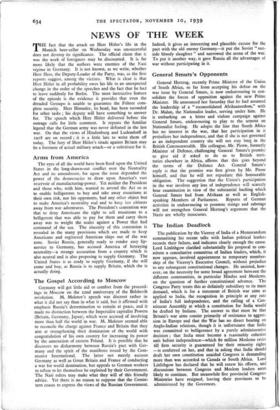The Indian Deadlock
The publication by the Viceroy of India of a Memorandum summarising his recent talks with Indian political leaders records their failure, and indicates clearly enough the cause. Lord Linlithgow clarified substantially his proposal to con- stitute a consultative committee of Indian leaders, which, it now appears, involved appointment to temporary member- ship of the Viceroy's Executive Council, without prejudice to any subsequent constitutional changes. He insisted, how- ever, on the necessity for some broad agreement between the different communities, in particular Hindus and Moslems, on the question of further constitutional advance. The Congress Party treats this as definitely subsidiary to its main demand, which is for a statement of British war aims as applied to India, the recognition in principle at any rate of India's full independence, and the calling of a Con- stituent Assembly at which a constitution for India would be drafted by Indians. The answer to that must be that Britain's war aims consist primarily of resistance to aggres- sion in Europe and that the War has no direct bearing on Anglo-Indian relations, though it is unfortunate that India was committed to belligerence by a purely administrative decision ; that India must become a reasonably cohesive unit before independence—which 80 million Moslems resist till firm security is guaranteed for their minority rights —is conferred on her, and that in asking that India should draft her own constitution unaided Congress is demanding more than was accorded to Canada or South Africa. Lord Linlithgow has declared that he will renew his efforts, and discussions between Congress and Moslem leaders seem likely to continue. But meanwhile five provincial Congress Ministries have resigned, leaving their provinces to be administered by the Governors.




































 Previous page
Previous page